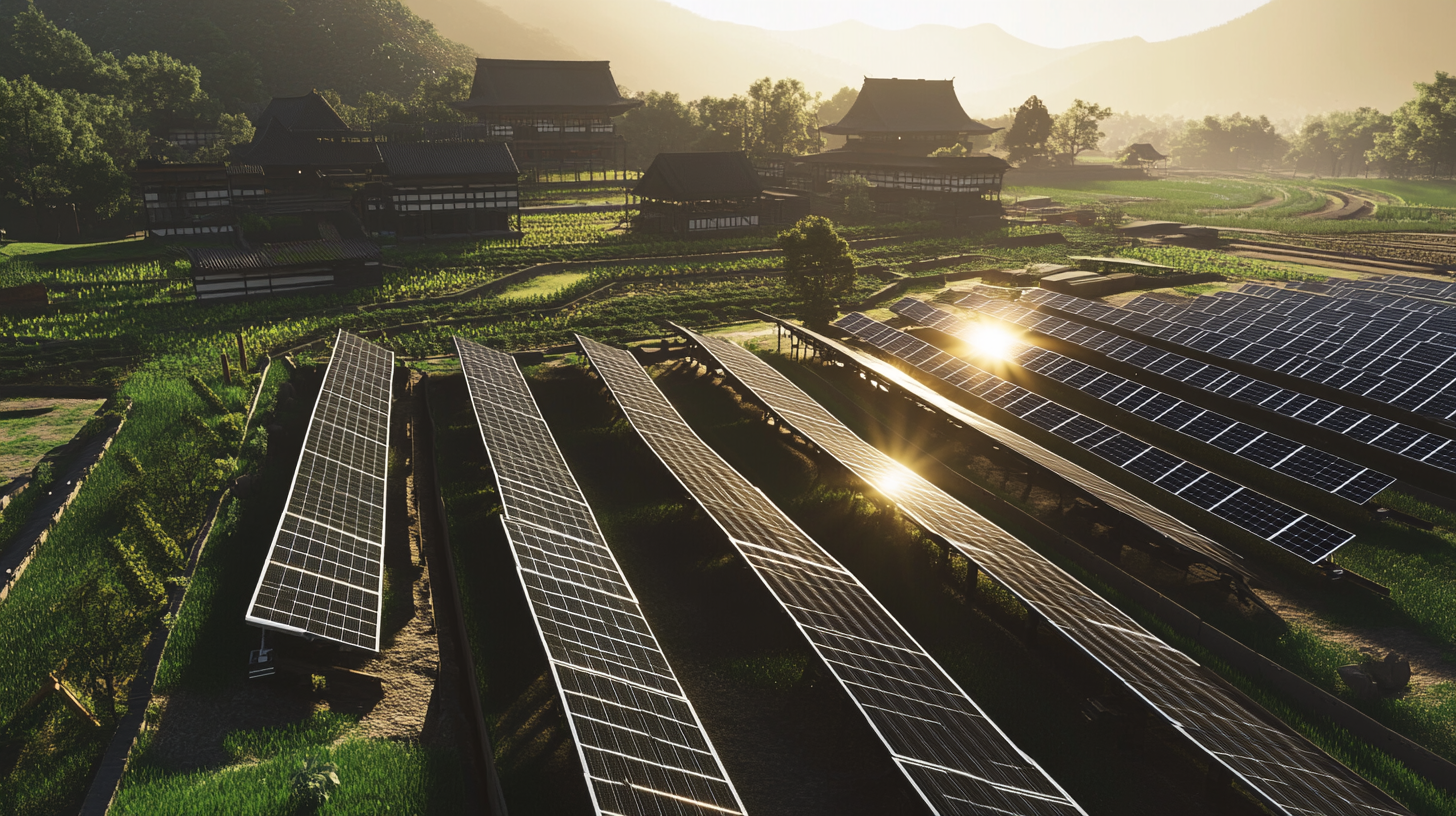
Status and development of PV systems in Japan. Especially in the area of solar parks, solar parking spaces and PV roof systems – Image: Xpert.Digital
New ways of solar energy: Japan's successful concept for a green future
Progress and prospects of photovoltaic development in Japan
Japan has established itself as a leading player in the development and use of photovoltaic (PV) technologies in recent decades. In particular, the innovative approaches to large-scale solar parks, solar carports and rooftop PV systems in the residential and commercial sectors show how the country is meeting the challenges of limited land resources and high energy requirements. This article provides a detailed analysis of the status quo, developments and future prospects of the Japanese PV market.
Large-scale solar parks: opportunities and challenges
With a cumulative PV capacity of about 90 GW by the end of 2023, Japan is among the global leaders in solar energy deployment. Annual capacity increases of around 6 GW underline the market's dynamism. Nevertheless, large-scale solar parks face significant hurdles:
Land scarcity and cost problems
The limited availability of land and the high construction and installation costs limit the construction of new large-scale facilities. Suitable space is scarce and expensive, especially in urban regions.
Zoning regulations and environmental regulations
Strict legal regulations make expansion difficult. Environmental aspects and consideration of local interests must be taken into account when choosing a location.
Innovative solutions
To meet these challenges, Japan is increasingly relying on agrivoltaics, i.e. the combination of agriculture and photovoltaics. This method enables the dual use of land by generating both energy and agricultural yields.
A significant structural change can also be seen in state funding policy. The original feed-in tariff (FIT) system has been replaced by a feed-in premium (FIP) system for larger projects. This approach rewards operators who efficiently adapt their assets to market prices, while promoting cost reduction and competitiveness.
Solar parking spaces or solar carports: Multifunctional energy sources
Solar carports are becoming increasingly important in Japan because they make intelligent use of existing infrastructure and offer a variety of advantages. These systems combine the generation of renewable energy with additional functions such as weather protection and a reduction in urban heat development.
Growing popularity
- Major retail chains like Aeon Mall are pushing the installation of solar carports. By 2025, the company plans to equip more than 50 locations with a total capacity of 15 MW.
- Municipalities and private companies are also recognizing the benefits of these systems and are increasingly investing in solar carport projects.
Challenges and potential
Although installation costs are higher than rooftop PV systems, solar carports are becoming increasingly competitive. Reasons for this include economies of scale, technological advances and the ability to use them in urban areas with limited space. The integration of charging infrastructure for electric vehicles (EVs) makes these systems particularly future-proof and attractive.
Rooftop PV systems: Focus on decentralized energy supply
Residential sector: solar energy for households
With limited land space, Japan is increasingly relying on rooftop PV systems, which accounted for almost half of the total installed PV capacity by the end of 2023. Around 20% of this segment was residential buildings.
State funding
Starting in 2025, solar panels will be mandatory on new buildings in Tokyo, a model that may be expanded to other prefectures. Subsidies and attractive feed-in tariffs (16 JPY/kWh in 2024) offer additional incentives for private households.
Cost reduction
The prices for private solar systems have fallen sharply in recent years. In 2021, the cost of systems less than 10 kW averaged 220 JPY/W, making the purchase more affordable for households.
Storage solutions
The integration of battery storage enables households to use excess energy efficiently and become less dependent on the power grid. This technology is particularly valued at a time when power outages due to natural disasters are not uncommon.
Commercial and industrial installations
The roof segment is dominated by commercial PV systems, which account for around 80% of the installed capacity. These systems are particularly attractive for companies that can reduce their energy costs through self-consumption models.
Regulatory incentives
FIT rates between 10 and 12 JPY/kWh, depending on the system size, as well as the exemption of smaller systems from tendering processes promote expansion.
Efficiency gains
Modern technologies enable higher energy yield and lower maintenance costs, which further increases the cost-effectiveness of these systems.
Future trends and innovative solutions
New technologies and approaches
In addition to traditional PV applications, Japan is increasingly relying on innovative solutions to optimize land use and promote the integration of renewable energies:
Floating photovoltaics
PV systems installed on reservoirs and bodies of water offer a promising alternative to land-based systems. They minimize the space required and at the same time help to cool the modules, which increases efficiency.
Network capacity and curtailment
In 2023, renewable energy curtailments due to grid congestion were five times more frequent than before. The government is working to improve the grid infrastructure to solve these problems and further increase the share of renewable energy.
Long term goals
Japan has set ambitious goals to achieve its climate neutrality goals. By 2030, cumulative PV capacity is expected to increase to 125-154 GW. This requires annual installation rates of 8-14 GW, to be achieved through a combination of rooftop PV systems, solar carports and large-scale projects.
Corporate Power Purchase Agreements (PPAs)
PPAs are becoming increasingly important as companies look for long-term solutions to reduce their carbon footprint and maintain stable energy prices. These agreements promote the expansion of commercial PV systems and strengthen demand for renewable energy.
Combination of political will, technological innovation and social commitment
The Japanese PV market is undergoing profound change. From large-scale solar parks to decentralized solutions such as roof systems and multifunctional applications such as solar carports, there is a clear trend towards a more flexible and efficient energy supply. Supported by government incentives and innovative technologies, Japan is overcoming the challenges of its geographical environment and setting new standards in the use of renewable energy.
With a combination of political will, technological innovation and social commitment, Japan is at the forefront of the global energy transition. This path not only shows how renewable energy can be used effectively, but also provides inspiration and a role model for other countries that want to reduce their dependence on fossil fuels.
📣 Similar topics
- 📷 Progress through sun: Japan's pioneering role in photovoltaics
- 🌏 Japan and the energy transition: PV innovations in focus
- 🏙️ Solutions for cities: solar carports and rooftop PV in Japan
- 🌱 Agrivoltaics: Agriculture meets solar energy
- 🌊 Floating PV systems: An answer to land shortages
- ⚡ Energy transition thought smart: From FIT to FIP policy in Japan
- 🏠 Rooftop PV in Japan: A successful model from households to businesses
- 🚗 Solar for electric cars: Carports as a multifunctional energy solution
- 🔋 From battery to grid: technologies of the future for Japan's PV market
- 🌅 Achieving climate goals: Japan's path to 154 GW of PV capacity by 2030
#️⃣ Hashtags: #Photovoltaics #Japan #Energy Transition #Solar Innovation #Climate Neutrality
Our recommendation: 🌍 Limitless reach 🔗 Networked 🌐 Multilingual 💪 Strong sales: 💡 Authentic with strategy 🚀 Innovation meets 🧠 Intuition
At a time when a company's digital presence determines its success, the challenge is how to make this presence authentic, individual and far-reaching. Xpert.Digital offers an innovative solution that positions itself as an intersection between an industry hub, a blog and a brand ambassador. It combines the advantages of communication and sales channels in a single platform and enables publication in 18 different languages. The cooperation with partner portals and the possibility of publishing articles on Google News and a press distribution list with around 8,000 journalists and readers maximize the reach and visibility of the content. This represents an essential factor in external sales & marketing (SMarketing).
More about it here:
We are there for you - advice - planning - implementation - project management
☑️ SME support in strategy, consulting, planning and implementation
☑️ Creation or realignment of the digital strategy and digitalization
☑️ Expansion and optimization of international sales processes
☑️ Global & Digital B2B trading platforms
☑️ Pioneer Business Development
I would be happy to serve as your personal advisor.
You can contact me by filling out the contact form below or simply call me on +49 89 89 674 804 (Munich) .
I'm looking forward to our joint project.
Xpert.Digital - Konrad Wolfenstein
Xpert.Digital is a hub for industry with a focus on digitalization, mechanical engineering, logistics/intralogistics and photovoltaics.
With our 360° business development solution, we support well-known companies from new business to after sales.
Market intelligence, smarketing, marketing automation, content development, PR, mail campaigns, personalized social media and lead nurturing are part of our digital tools.
You can find out more at: www.xpert.digital - www.xpert.solar - www.xpert.plus

